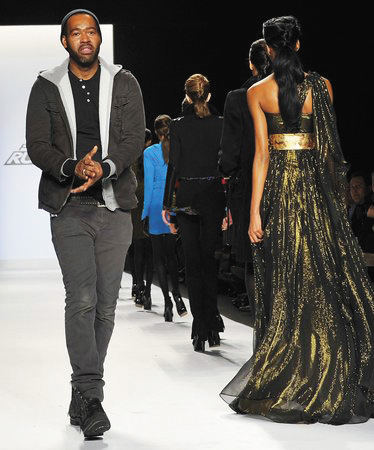Black may be the most ubiquitous color in fashion, but not when it comes to who wins “Project Runway.” After seven seasons, the award-winning reality TV series has yet to produce a Black winner.
The popular Lifetime program helps launch the careers of emerging American fashion designers. Through a series of weekly design challenges and eliminations, contestants vie to become one of three finalists who show a collection at New York Fashion Week. The coveted prizes for the winner include a five-figure check to create a new collection, a photo spread in Marie Claire women’s magazine, and priceless publicity.
| EMILIO SOSA in season seven finale in April—another Black runner-up. |
But thus far, no Black contenders have emerged victorious. And it’s certainly not due to lack of talent. Five times, Black designers have made the finals. Three of those times, they have come in second place.
In the first season, Kara Saun placed second. In season three, Michael Knight came in fourth and won the publicly voted Fan Favorite award. In season five, Korto Momolu was second and Fan Favorite. And in season seven finale’s last month, Emilio Sosa was awarded second place after winning more weekly challenges than any other competitor.
So the obvious question is why do Black designers get close but never win? The answer is as simple as the all-White judging panel: show host and former supermodel Heidi Klum, popular fashion designer Michael Kors and Marie Claire editor Nina Garcia. A guest judge usually joins the panel for the contestants’ weekly challenges, but rarely is that person Black.
All of this matters. While it would probably be unfair to call the judges racist, their decisions about who remains in the competition and who ultimately wins are almost certainly influenced by race. The inability of a panel of White judges to perceive a Black designer as best—or, at least better than a White designer—is a reflection of the New York establishment’s general attitude toward Black designers.
As a reality show, “Project Runway” lives up to its genre. The reality is that Black designers are almost invisible at New York Fashion Week in particular and in the elitist, insular New York fashion establishment in general. That may be why it’s so difficult for “Project Runway” judges to select a Black winner—they rarely see Black designers at all, let alone Black designers recognized as the cream of the crop.
There is a point where fashion becomes almost entirely subjective, when fabrics are of comparable quality and clothes are equally tasteful and well made. At this point, the only differentiating measure is personal preference. And personal preference is nothing more than a collection of one’s biases.
Some say it may be better for Black designers that they do not win, pointing to the commercial success of also-rans in other reality TV competitions who were unfettered by the contractual constraints placed on winners. That’s true for some shows, especially “American Idol,” where the public has a direct say in a contestant’s success both during and after the show.
But in terms of the hard-won legitimacy that “Project Runway” confers upon the winner—and considering how difficult it is for even the most talented designers to become part of the industry’s “in” crowd in New York City—winning the competition is probably the best thing that can happen to a contestant’s career.
Although no Black designer has taken home the coveted title, several finalists have used the show as a launching pad.
After appearing on “Project Runway,” Saun went on to score numerous plum gigs, including costume design for the hit MTV series “America’s Best Dance Crew,” ABC-TV’s “True Beauty” series, and Disney’s Cheetah Girls world tour in 2008.
Knight launched a unisex fragrance, a line of male and female lingerie, and a custom T-shirt for Starbucks. He also custom designs for celebrities and in March debuted his spring-winter 2010 collection at Charleston Fashion Week.
Momolu showed her newest apparel collection off-site at New York Fashion Week to positive reviews in February and styled a handbag and accessories line that recently launched at Dillard’s department stores.
In an “All-Star Challenge” special edition of “Project Runway” last year, Momolu emerged from a field of contestants from prior seasons to take second place. Another past first runner-up, Daniel Vosovic, was named winner and received $100,000.
In a subsequent interview, Momolu told People.com: “I feel like I should have won but in my heart I knew they weren’t going to give it to me. I made sure I had a collection [the judges] would have no negative comments for—and there were none. There was nothing wrong with my collection.”
For Black designers who want a fair shake—and for Black viewers fed up with the snubs—it may be time to boycott “Project Runway” and launch a similar show with judges who can respect African-Americans as serious fashion designers.
(LaMont Jones is an award-winning fashion journalist and editor of TheStyleArbiter.com.)
